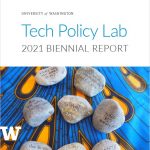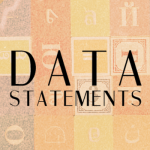December 14, 2024
Paper by Co-Director receives NSA award
National Science Foundation

Research by Co-Director Yoshi Kohno was awarded by the NSA’s 2024 Best Scientific Cybersecurity Paper Competition. The NSA Research Directorate recently selected “Ethical Frameworks and Computer Security Trolley Problems: Foundations for Conversations,” by professors Tadayoshi Kohno, University of Washington; Yasemin Acar, Paderborn University (Germany)/The George Washington University; and Wulf Loh, University of Tübingen (Germany) for […]
MoreDecember 8, 2024
In new paper, TPL post-doc imagines design beyond humans

Tech Policy Lab post-doctoral scholar Nick Logler recently published research that highlights how design intersects with a more-than-human world. “Learning in place: Reimagining design practice as ecological literacy” chronicles Logler’s time spent in a coastal wildlife refuge and attempts to foreground a more-than-human experience. His reflections and conclusions offer five interrelated considerations for designers and […]
MoreJuly 31, 2024
TPL paper wins student award at PETS

A Tech Policy Lab paper was awarded in the Runner Up category at the 2024 Proceedings on Privacy Enhancing Technologies Symposium. “Over Fences and Into Yards: Privacy Threats and Concerns of Commercial Satellites,” was written by Rachel McAmis, Mia Bennett and Tadayoshi Kohno, along with Mattea Sim of University of Indiana Bloomington. The paper captures […]
MoreJuly 23, 2024
Article highlights success of ‘Diverse Voices’ impacting court system

A new article published by Co-Director Emeritus Batya Friedman and Information School Postdoctoral Scholar Lassana Magassa reports on a recent intervention that brought the “Diverse Voices” method forward to improve the Washington State Access to Justice Technology Principles. In “Toward inclusive justice: Applying the Diverse Voices design method to improve the Washington State Access to […]
MoreNovember 4, 2022
Co-Director reflects on the long-term view of technology
UW iSchool

Co-Director Batya Friedman tackled the difficult questions in a recent article by the University of Washington’s School of Information: Does it make life better for people, now and in the future? Does it account for human values? Is it something we even need in the first place? Throughout the article, she discusses past work on Value […]
MoreApril 28, 2022
Tech Policy Lab Releases Whitepaper on Agricultural Technology Policy

Ways to Grow: New Directions for Agricultural Technology Policy New Tech Policy Lab whitepaper highlights need for balance between expanding agricultural technology and investment supporting regional production SEATTLE, Wash., April 27, 2022 – The pandemic opened our eyes to a longstanding reality: the American food system cannot handle disruption. And there is another crisis on […]
MoreJanuary 27, 2022
Co-Director highlights arising security threats with increased used of AR and the metaverse
VentureBeat

TPL Co-Director Tadayoshi Kohno and TPL Faculty Associate Franziska Roesner were featured in VentureBeat’s new piece on the metaverse with regards to their paper that calls into question the new immersive nature of AR. Forthcoming AR technologies “may explicitly interface with the body and brain, with sophisticated body-sensing and brain-machine interface technologies”, they said, and “the immersive […]
MoreJanuary 11, 2022
Tech Policy Lab Releases Biennial Report

The Tech Policy Lab is please to share our 2020-2021 Biennial Report. Highlights include the Lab’s work on privacy and COVID, mitigating bias in AI systems, using storytelling to explain tech policy, and technology’s relationship to food security. http://techpolicylab.uw.edu/wp-content/uploads/2021/12/Tech-Policy-Biennial-Report-2021-Final.pdf
MoreDecember 10, 2021
Data Statements highlighted in SpeechTechMag
Speech Technology Magazine

Co-Director and Professor Batya Friedman along with Faculty Associate and Professor Emily M. Bender’s recent paper titled “Data Statements for Natural Language Processing: Toward Mitigating System Bias and Enabling Better Science,” was highlighted in a natural language processing article by SpeechTechMag. It discussed AI in facial recognition systems and how data statements are key in understanding why […]
MoreMarch 20, 2019
Toward Inclusive Tech Policy Design: A Method for Underrepresented Voices to Strengthen Tech Policy Documents

New research published in Ethics of Information Technology introduces the Diverse Voices method and reports on two case studies demonstrating its use: one with a white paper on augmented reality technology, and the other with a strategy document on automated driving vehicle technologies.
More